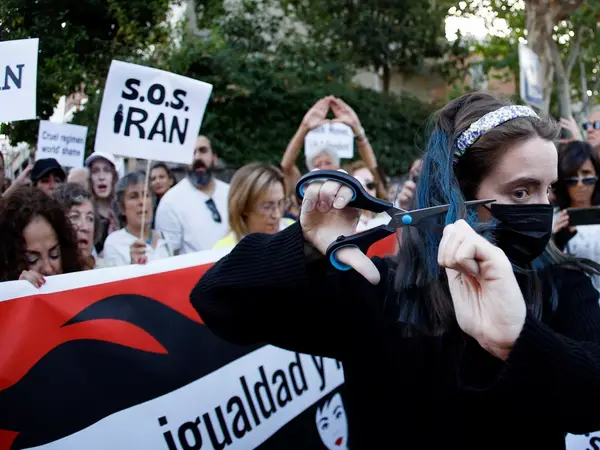The European Parliament adopted a resolution Thursday condemning Mahsa Amini’s killing in Iran and voiced support for protests demanding change in the country.
The resolution instructed all member states “to use the mechanisms envisaged in the EU Guidelines on Human Rights Defenders to support and protect these individuals [activists, protesters], in particular women’s rights defenders and EU-Iranian dual nationals.”
Iran’s foreign ministry Friday dismissed the resolution calling it “baseless and worthless” blaming extremist elements for pushing a campaign against the Islamic Republic.
On the same day, announcing new sanctions on some Iranian officials engaged in suppressing protests, US Secretary of State Antony Blinken said Washington will keep the pressure on Tehran.
“The United States will promote accountability for all those who direct and support actions that deny the people in Iran their rights to freedom of expression and of peaceful assembly. Today we designated seven security apparatus leaders responsible for the crackdown,” Blinken tweeted.
The United States on Thursday imposed sanctions on seven Iranian officials over the shutdown of internet access and the crackdown on peaceful protesters.
The US Treasury Department in a statement said it imposed sanctions on Iran's minister of interior, Ahmad Vahidi; Communications Minister Eisa Zarepour; and Vahid Mohammad Naser Majid, the head of the Iranian Cyber Police, among others.
"The United States condemns the Iranian government’s Internet shutdown and continued violent suppression of peaceful protest and will not hesitate to target those who direct and support such actions," Under Secretary of the Treasury Brian Nelson said in the statement.
But White House NSC coordinator John Kirby told the CNN that the administration is still committed to the revival of the 2015 nuclear deal, which would release tens of billion of dollars for Iran. He told CNN, “We still believe diplomacy is the best path forward to prevent Iran from achieving nuke weapon. But we’re not close to a deal right now. I’d not be thinking there's sanctions relief in the offing anytime soon for Iranians right now.”
Iranian activists and other have been urging the Biden Administration to formally withdraw from the nuclear talks in the light of Tehran’s intransigence and its violent crackdown of protesters, especially the killing of young women.
US Envoy for Iran Rob Malley told NPR that "What US wants is a government in Iran that respects people's fundamental rights. It's not a policy of regime change. It's a policy of backing people who're protesting peacefully, because they want to be able not to wear a headscarf yet face oppressive system."
The European Union and its member states are putting significant pressure on Iran, by foreign ministers telling Tehran to stop its mistreatment of citizens. However, Iran’s foreign minister Hossein Amir-Abdollahian has dismissed such calls, insisting that women are protected in his country and others should not intervene.
Addressing the European Parliament October 4, EU foreign policy chief Josep Borrell said that along with European Council President Charles Michel he raised the issue directly with Iranian President Ebrahim Raisi and called for accountability for the death of Mahsa Amini and restraint in the government’s reaction to the demonstrations.
He stressed that member states will continue to consider all the options at their disposal, including “restrictive measures,” at the next Foreign Affairs Council to address the killing of Mahsa Amini and the way Iranian security forces have been responding to the demonstrations.
“Unfortunately, it did not happen," Borrell said, adding that “Numerous reports clearly show that the response of Iranian security and police forces has been disproportionate and resulted in tens of dozens of lives lost.”
Expressing admiration for demonstrations he said, “These are facts, these are not opinions. These are facts. In the streets of Iran, the repression of the demonstrators has left behind tens of people killed.”
